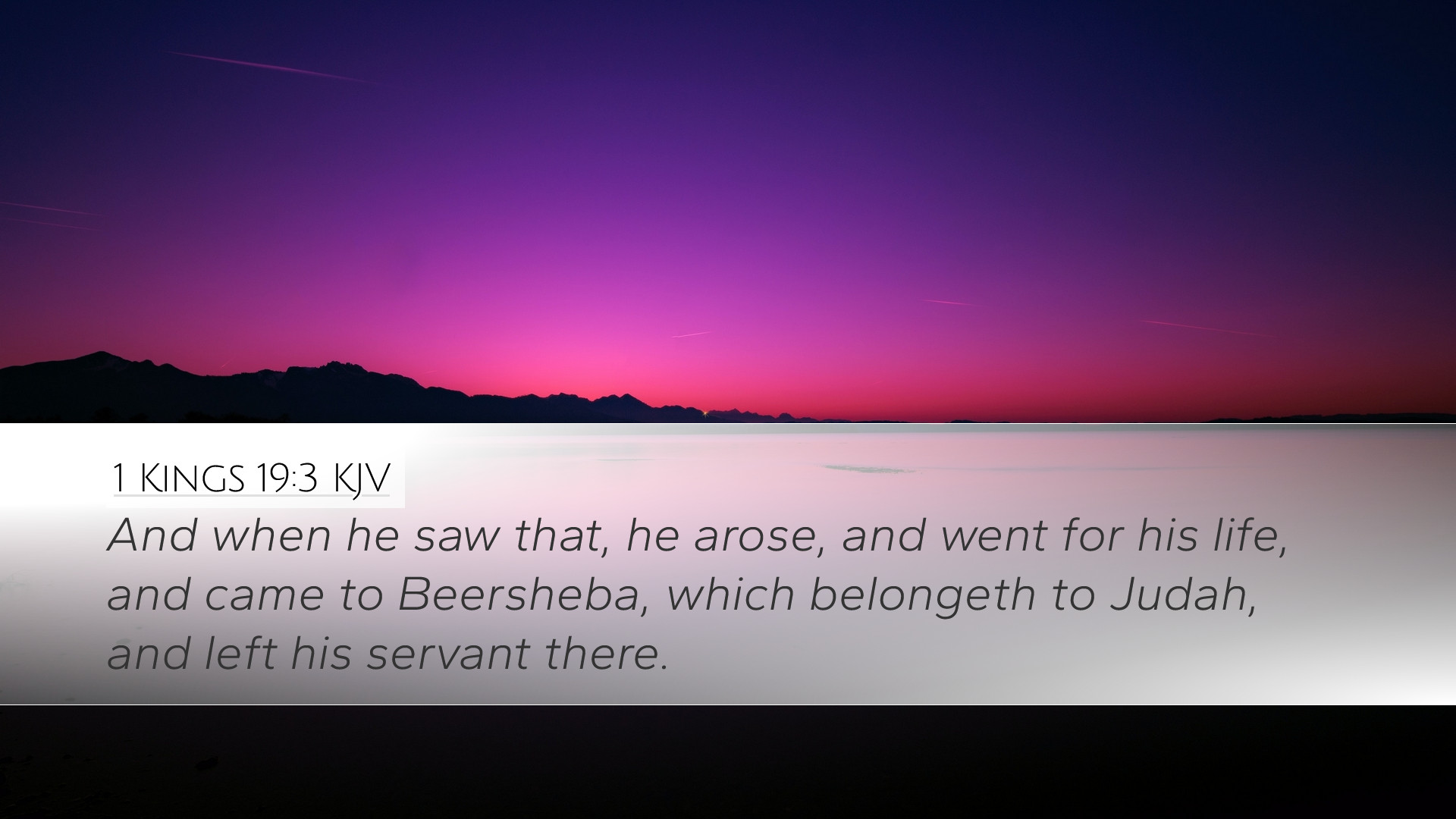Old Testament
Genesis Exodus Leviticus Numbers Deuteronomy Joshua Judges Ruth 1 Samuel 2 Samuel 1 Kings 2 Kings 1 Chronicles 2 Chronicles Ezra Nehemiah Esther Job Psalms Proverbs Ecclesiastes Song of Solomon Isaiah Jeremiah Lamentations Ezekiel Daniel Hosea Joel Amos Obadiah Jonah Micah Nahum Habakkuk Zephaniah Haggai Zechariah Malachi1 Kings 19:3
1 Kings 19:3 KJV
And when he saw that, he arose, and went for his life, and came to Beersheba, which belongeth to Judah, and left his servant there.
1 Kings 19:3 Bible Commentary
Commentary on 1 Kings 19:3
Text of 1 Kings 19:3 (ESV): "Then he was afraid, and he arose and ran for his life and came to Beersheba, which belongs to Judah, and left his servant there."
Introduction
The narrative of 1 Kings 19 presents a pivotal moment in the life of the prophet Elijah. Following a significant victory over the prophets of Baal, Elijah experiences profound fear and despair, leading him to flee to Beersheba. This trajectory reflects the human condition of vulnerability, illustrating how even the mightiest men of God can encounter deep emotional struggles. This commentary aims to explore the theological implications, emotional landscape, and practical lessons derived from Elijah's flight.
Contextual Background
Elijah, one of the foremost prophets of the Old Testament, emerges as a figure of divine authority amidst a corrupt Israelite monarchy. Chapter 18 depicts his confrontation with King Ahab and the prophets of Baal on Mount Carmel, culminating in a dramatic display of God's power. However, the very threat from Queen Jezebel shifts the landscape from triumph to tragedy.
Thematic Insights
-
The Fear of the Prophet:
Elijah's fear, as noted by Matthew Henry, reveals that the mightiest, when confronted with personal danger, can succumb to anxiety. This passage serves as a reminder that faith does not exempt one from moments of profound fear.
-
Running for Life:
Albert Barnes emphasizes the significance of Elijah’s flight. The phrase “ran for his life” underscores a primal instinct to survive, highlighting how our first response to threat can often be self-preservation rather than reliance on God.
-
The Harsh Reality of Despair:
Adam Clarke elaborates on the psychological aspects of Elijah's journey, portraying the prophet's emotional turmoil. The act of running indicates not only physical fear but also a sense of defeat, resonating deeply with those who face periods of depression or discouragement.
Exegesis of Key Terms
-
"Afraid":
The Hebrew term used indicates a deep-rooted fear, possibly suggesting reverence mingled with terror. This term captures the complex emotional state of one who has witnessed God's power yet finds himself in a perilous situation.
-
"Ran for his life":
This phrase implies a dramatic escape, illustrating the urgency of Elijah's situation. Clarke elucidates that this running indicates a loss of hope, contrasting sharply with his earlier confident stance against the prophets of Baal.
-
"Beersheba":
A place of significant historical and theological resonance, Beersheba represents a location of refuge. It is important to note that Elijah not only seeks physical safety but also spiritual distancing from the overwhelming pressures of his calling.
Theological Reflections
The passage prompts profound theological reflections. The dichotomy of power and despair illustrates the struggles within God's call. Even a prophet like Elijah experiences profound emotional distress, reminding us of the humanity underlying spiritual leadership. This moment evokes a rich tapestry of themes—fear, isolation, and the need for divine reassurance. Pastors and theologians can glean insights into the pastoral care of individuals facing burnout or fear, emphasizing the importance of community and divine presence.
Lessons for Pastoral Ministry
-
Recognizing Vulnerability:
Ministry can be isolating, and like Elijah, leaders may face moments of despair. This passage is a call for pastors to acknowledge their own vulnerabilities and seek support and counseling when needed.
-
The Need for Community:
Elijah left his servant, highlighting the tendency to isolate when in distress. Community is essential for resilience, and ministers should foster environments where vulnerability can be openly expressed.
-
Dependence on God:
This narrative is a reminder of the essential need for continued dependence on God, especially in times of fear and uncertainty. In the darkest moments, God draws near to those who call upon Him.
Conclusion
Elijah’s flight to Beersheba encapsulates the profound complexities of faith amidst fear. It serves as an illustration of the struggles faced by individuals called to lead, continuously reminding us of our human frailty before divine strength. For students, theologians, and pastors alike, this narrative provides rich resources for reflection on the nature of our relationship with God in moments of turmoil and the importance of communal support in the face of fear.


